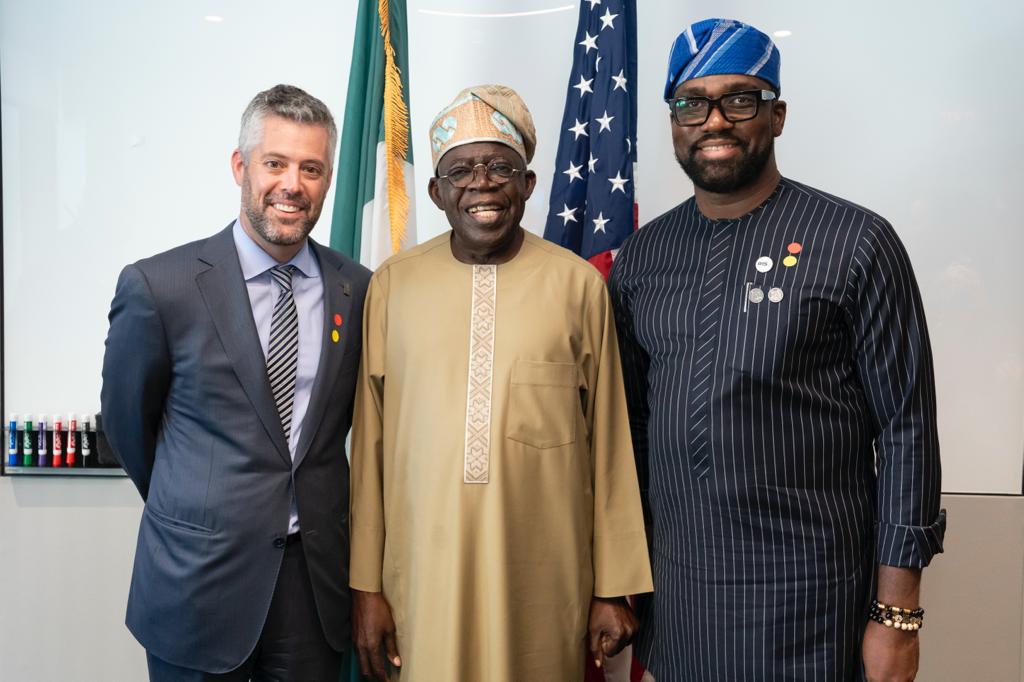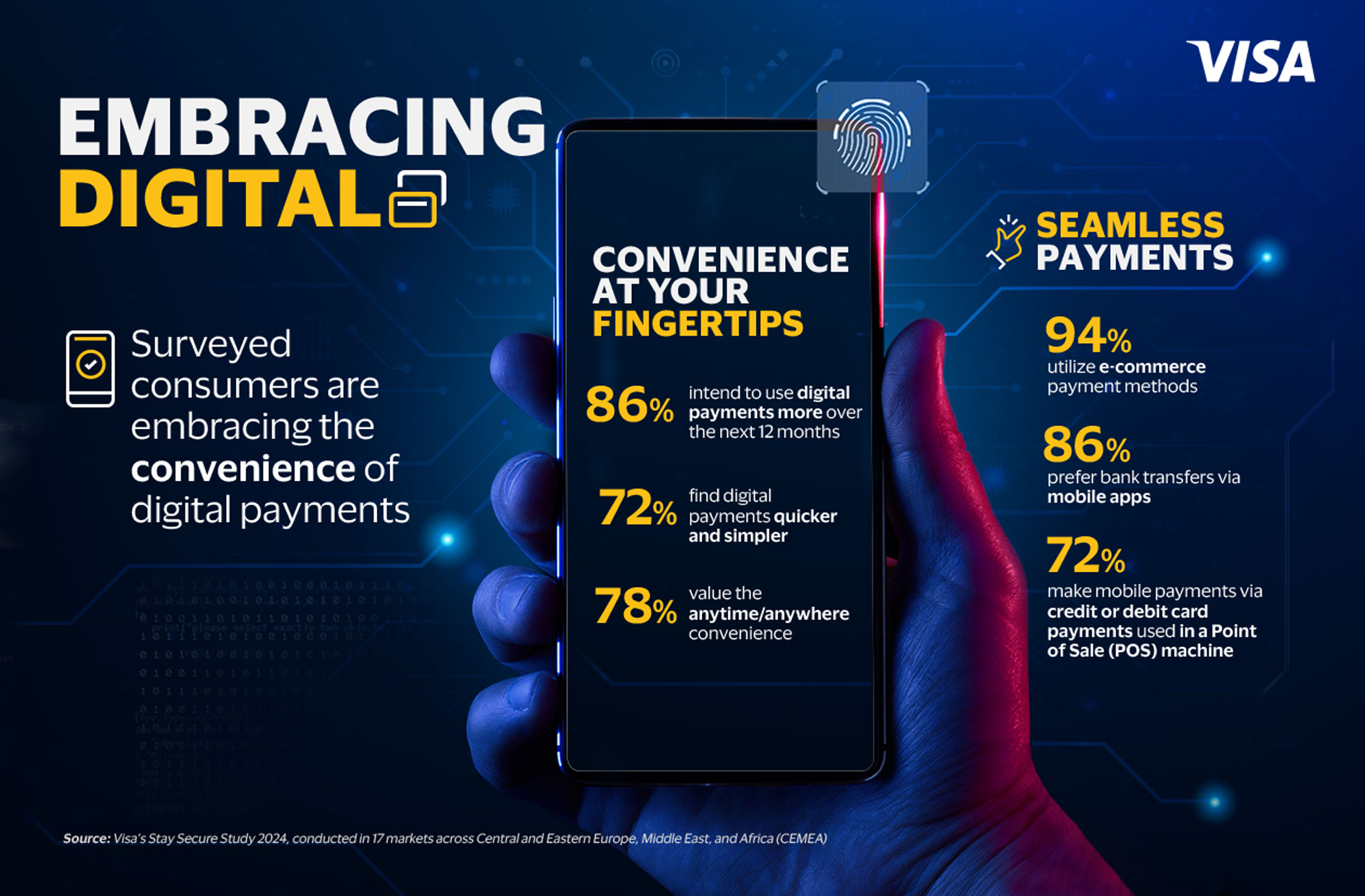Telecom
IHS Towers Lists Giant Strides in Meeting with President Tinubu

IHS Towers, one of the largest independent owners, operators and developers of shared communications infrastructure in the world, has said its operations have earned Nigeria a very strong foothold in the global telecommunications market. The company made the assertion after the meeting it held with His Excellency President Bola Ahmed Tinubu at the sidelines of the United Nations General Assembly (UNGA), New York recently.

IHS Towers’ Executive Vice President and Chief Human Resources Officer, Ayotade Oyinlola and Executive Vice President of Communications, Colby Synesael meet the President, Federal Republic of Nigeria, His Excellency Bola Ahmed Tinubu in a private session at a side event hosted by the U.S. Chamber of Commerce during the 78th session of the United Nations General Assembly (UNGA) in New York.
Photo credits: U.S. Chamber of Commerce
EVP, and Chief HR Officer, Ayotade Oyinlola of IHS Towers, said the company’s story epitomizes the potential of Nigerian companies on the global stage.
“In an era where connectivity serves as the lifeblood of societies and economies, IHS Towers stands as a beacon of success, demonstrating how a company that started in Nigeria can expand to become a global powerhouse. In a little over two decades, IHS has evolved into a multinational telecom infrastructure giant with operations in 11 countries across three continents and impacting the lives of over 750 million people.”
He noted that, despite the company’s expansive global footprint, which includes a remarkable global tower count of nearly 40,000 across Nigeria, Brazil, Cameroun, Colombia, Cote d’Ivoire, Kuwait, Peru, Rwanda, South Africa, United Arab Emirates, and Zambia, the company proudly maintains its Nigerian identity.
EVP of Communications, Colby Synesael further informed that IHS Towers plays the role of a global corporate ambassador building investor confidence internationally.
“As the fifth-largest independent multinational tower company globally in terms of tower count, IHS exemplifies efficiency and scale. The company made history by becoming the first Nigerian-rooted company to be publicly traded on the New York Stock Exchange (NYSE) in 2021, which symbolizes Nigeria’s immense potential on the world stage, fostering global investor engagement, and playing a significant role in educating international investors on the advantages of investing in Nigeria.”
Synesael listed some of the achievements the company has recorded which have made it a significant bedrock within the telecommunications value chain in the country to include lowering entry barriers and enhancing cost-effectiveness for telecommunications stakeholders.
“IHS’s substantial investments in passive infrastructure, including leasing tower space to providers, such as mobile network operators and internet service providers, has effectively lowered entry barriers and enhanced cost-effectiveness, enabling these providers to expand their operations. Also, with the ownership of over 16,000 towers in Nigeria and the deployment of 6,500 kilometres of metro optic fibre across 36 states and the Federal Capital Territory (FCT), IHS has facilitated the expansion of telecom services, ensuring that more Nigerians have access to connectivity than ever before.”
According to him, these giant strides have led to diverse portfolio of services includes optic fibre connectivity, rural telephony, and cutting-edge solutions such as the Internet of Things (IoT) and Edge Data Centre thereby bridging the digital divide and ensuring connectivity for all.
Oyinlola noted various other contributions the company is making towards the growth and development of the country. Some of these contributions include being part of the telecommunications sector’s 16.06 percent contribution to the country’s GDP, according to the Nigerian Bureau of Statistics; job creation including over 1,100 direct employees and an additional 40,000 indirect employees, including contractors spanning diverse sectors like power/energy utility, logistics, real estate, oil and gas, civil engineering, and core telecommunications in Nigeria.
On the corporate social responsibility sphere, the IHS Towers’ Mission T project has provided digital learning opportunities to over 550,000 students, equipping them with essential digital skills for the future. Furthermore, its collaboration with UNICEF on the School Connectivity project has impacted the lives of 70,000 Nigerian students across 187 schools in 15 states.
Also, according to the company, it has been at the forefront of advocating for sustainable, green energy solutions. In 2022 alone, the company dedicated a substantial investment of over $100 million to its Project Green initiative. This initiative is geared towards reducing carbon emissions across IHS Towers’ extensive network of over 16,000 sites in Nigeria by a commendable 50 percent by the year 2030.
Telecom
Open Access Fabrics Set to Drive Connectivity to Achieve a Digital Economy

Ayotunde Coker, chief executive officer of OpenAccess Data Centre has described Open Access fabric, the company’s Africa-led interconnection platform as key driver of a digital economy, offering a range of virtual connectivity services from Open Access Data Centres (OADC) facilities.

Empowered by West Indian Ocean Cable Company (WIOCC), extensive digital backbone, OAfabric offers enterprises and service providers access to diverse digital ecosystems, supporting user-to-service, user-to-user and site-to-site connectivity.
Coker stated this during a tour of Open Access Data Centre facility in Lagos by some journalists recently.
According to him, “designed as a future-ready foundation, OAfabric unites cloud and local connectivity with OADC’s market-leading colocation solutions, establishing an innovative, scalable African infrastructure platform that addresses both local and global digital transformation demands.
“OA fabric offers a reliable, adaptable interconnection platform to support Africa’s growing digital needs and hybrid infrastructures for local and global providers
“Enabling secure, direct cloud connections, OA fabric supports data sovereignty and fosters local provider growth, OA fabric provides IX peering, virtual interconnection, and tailored IP services for Africa’s digital landscape.
“It’s not about a particular service provider, it’s about everybody. Once you have a network and you are able to route traffic, even if you are not live yet, and you are hoping to come in the future, we are waiting for you to come on board. So, that platform converges everybody.
“With Open Access fabric, everyone is expected to interconnect. You are collaborating with the government. You are collaborating with the banks. We are collaborating with all these guys to interconnect everyone, Microsoft, Google, all the cloud companies connect into it, because we already have the connectivity business”.
He noted that, “Through OA fabric, all the other connectivity providers have access to any content on OA fabric, so SMB, SMEs, MSMEs, who probably doesn’t have a registered business, but on social media, selling clothes and things like that, can have cost effective access to resources on the internet.
Speaking on Metro fiber project which OADC is partnering with WBT, Coker explained that they have covered over 5 million homes in Lagos. “The job of the Internet Service Provider or MNO in the project is to maintain relationship with the residents of that area, make sure that the infrastructure is secured”.
Telecom
MTN Nigeria and Pan-Atlantic University Invite Media Practitioners for 4th Media Innovation Programme

MTN Nigeria Communications Plc and the School of Media and Communication, Pan-Atlantic University, have announced a call for applications from qualified media practitioners (including content creators) to participate in the 4th edition of the MTN Media Innovation Programme (MTN MIP-4).

The programme commences on May 19, 2025, on the Main Campus of the Pan-Atlantic University, Ibeju-Lekki, Lagos.
In collaboration with the School of Media and Communication, Pan-Atlantic University, MTN Nigeria launched MIP in 2022 to enable media practitioners gain deeper insight into the ever-evolving media landscape.
The six-month fully funded certificate fellowship, which includes a study visit to the University of Johannesburg, South Africa is open to media practitioners across all strata of the media industry including print, electronic and online platforms. The programme is also open to social media content creators.
“When we launched MIP in 2022, our goal was to enhance media professionals’ reporting capabilities and deepen their understanding of the technology sector, empowering them to become true media innovators. Seeing the impact of the programme over the past three years has been both inspiring and humbling.
“We are proud to continue this initiative and invite all eligible media professionals and content creators to seize this opportunity by applying for the fourth cohort,” said Tobe Okigbo, Chief Corporate Services & Sustainability Officer, MTN Nigeria.
Speaking on the impact of the programme, the Dean, School of Media and Communication (SMC), Pan-Atlantic University, Dr Ikechukwu Obiaya, said that the programme continues to improve and evolve.
“Given the challenges of today’s fast-changing media space, there is an ever-greater urgency to cultivate a new generation of media professionals who will drive innovation and excellence to meet today’s media needs.
“SMC will leverage its extensive experience in training media professionals to equip this next cohort. And we will do this with our usual emphasis on creativity and ethics.”
At the end of the training, the 20 successful applicants, who will qualify as Fellows, will have been trained on Nigeria’s technology sector, the relationship between media and technology and improved content creation opportunities. They will also be equipped with the skills to adapt to the changing realities that guarantee career and financial success in their professional practice. Fellows will also have access to professional resources and mentorship from PAU’s erudite faculty.
Interested journalists, bloggers and content creators can apply at https://bit.ly/MTN_MIP2025
Applications open on Monday, March 24 and close on Monday, April 7, 2025.
Telecom
Visa Study Highlights Increased Security Awareness as Digital Payments Thrive Across CEMEA

A new study commissioned by Visa reveals a rise in consumer awareness and proactive security measures for digital payments across Central and Eastern Europe, the Middle East, and Africa (CEMEA).

The ninth annual Stay Secure study, which surveyed 5,800 adults across 17 diverse CEMEA markets, found that 98% of consumers now actively take precautions to secure their online transactions, showcasing increased savviness as digital payments gain momentum.
While 64% of respondents in Nigeria acknowledge their vulnerability to scams like phishing, the increased adoption of security measures and preference for stronger authentication indicate a positive shift in consumer behavior since the last edition of the Stay Secure study in 2023. Consumers are now actively spotting red flags and verifying the legitimacy of online interactions, showing a marked increase in awareness.
Other key insights emerging from the research bode well for the continued acceleration of digital payments across the region, with over three-quarters of all respondents stating that they mostly or completely trust digital payments, regardless of the threat of fraud. 86% of consumers across Nigeria anticipate that they will increase their use of digital payments over the next year.
“The digital payments landscape is evolving rapidly, and consumers across Nigeria are embracing its convenience while becoming more vigilant about security,” said Andrew Uaboi, Vice President & Head, Visa West Africa.
“Consumer education is our best defense against fraud, and industry collaboration makes this possible. As scams grow more sophisticated, the battle for security never stops. Consumers increasingly trust partners who take tangible steps to protect them.”
The ‘Stay Secure’ study highlights evolving consumer preferences, which could offer Visa’s stakeholders actionable intelligence for trust-building strategies and inform the creation of educational materials to empower consumers against fraud.”
Key Findings of the Visa Stay Secure Study:
– 94% surveyed in Nigeria utilize e-commerce payment methods.
– 82% surveyed in Nigeria are more likely to trust payment programs run by the government (e.g., instant payments, local cards, etc.) if they partnered with a well-known brand like Visa.
-51% surveyed in Nigeria feel more secure using digital payments.
-56% surveyed in Nigeria leverage online credit or debit card payments.
– 54% surveyed in Nigeria note that news about cyber fraud (e.g., data breaches, email scams, phishing, etc.) has impacted their use of digital payments.
– 43% rank Boomers (60-78) as most likely to fall victim to online scams.
Visa’s Commitment to a Secure Digital Future
Visa has been at the centre of AI in payments, investing $3.3 billion in our AI and data infrastructure over the last decade. In 2024, it introduced three new AI-powered risk and fraud prevention solutions, as part of the Visa Protect suite, that are designed to help reduce fraud across immediate A2A and card-not-present (CNP) payments, as well as transactions on and off Visa’s network.
As the world’s largest SaaS platform, Visa combats cybercrime by deploying cutting-edge tools, expertise, and processes to help identify and mitigate fraud. The impact is undeniable: In the past year, Visa blocked $40 billion in fraudulent payment value, prevented 80 million fraudulent transactions, and averted over $122 million in estimated e-commerce fraud through malware detection.

 News2 days ago
News2 days agoNIPOST Explains Clamping Down on Illegal Logistics Services in Enugu

 Broadcasting2 days ago
Broadcasting2 days agoNGO Blasts MultiChoice for Tariff Hike in Nigeria, Slash in South Africa

 E-Business2 days ago
E-Business2 days agoOtti, Abia State Gov Promises Internet Access for all Abia Communities in 9 Months

 Telecom2 days ago
Telecom2 days agoTelcos Mull Introduction of Different Tariff Plans for Different States

 News2 days ago
News2 days agoNESREA Urges Nigerians to Dispose Batteries Properly to Avoid Hazards

 E-Financial2 days ago
E-Financial2 days agoCITN Seeks AI to Curb Revenue Leakage in Nigeria’s Tax System

 News2 days ago
News2 days agoTony Elumelu Foundation Grants $15m to 3,000 African Entrepreneurs

 E-Financial2 days ago
E-Financial2 days agoSEC Declares War on Capital Market Fraudsters

























